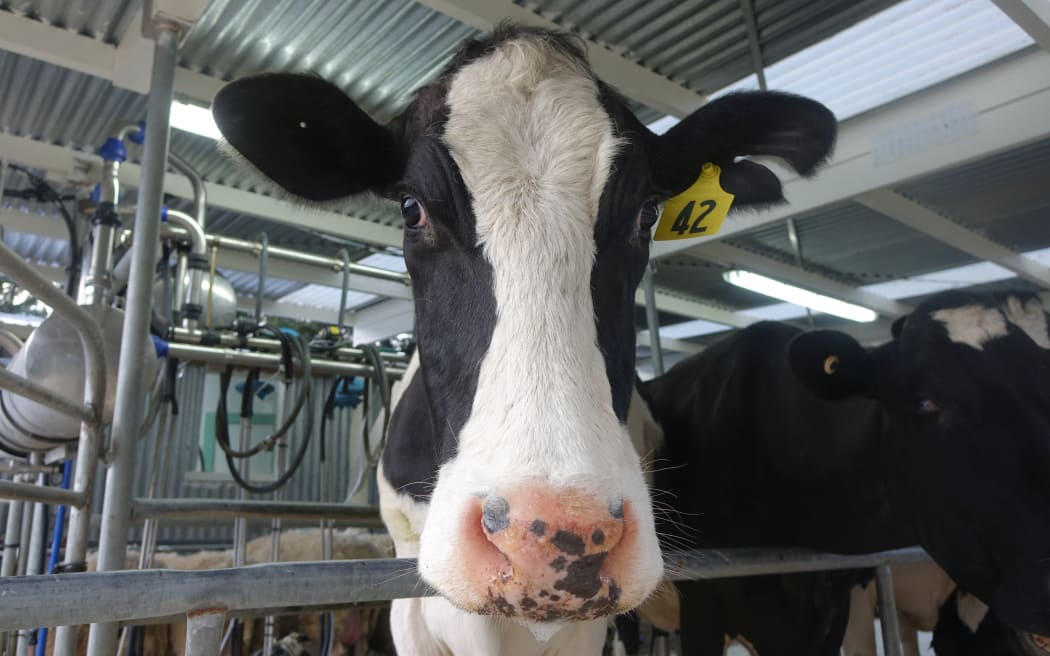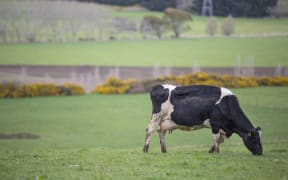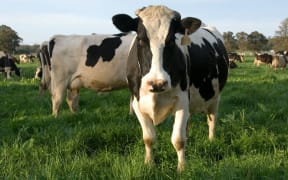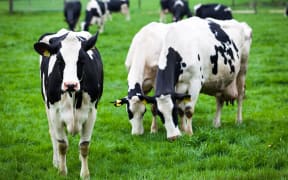
The price of whole milk powder fell to US$2548 a tonne. Photo: RNZ / Alexa Cook
Dairy prices crashed to their lowest levels in nearly five years at the Global Dairy Trade auction overnight, led by a 10.9 percent fall in the price of whole milk powder.
The average price fell 7.4 percent to US$2875 (NZD$4830) a tonne.
The price of whole milk powder, which strongly affects the payout for local farmers, fell to US$2548 a tonne, though prices for skim milk powder and butter also fell 5.2 percent and 3 percent respectively.
It follows a 4.3 percent fall in the previous fortnightly auction, with prices falling at most auctions this year amid softening demand from China.
Fonterra recently slashed its forecast milk price for this season and announced an even lower opening price for next season amid falling demand and lower global dairy prices.
On 4 August it reduced its 2023/24 season forecast price to $6.25 from $7.75 per kilogram of milk solids (kgMS) with a midpoint of $7 per kgMS.
Synlait then followed the co-op's lead, lowering its forecast milk price for suppliers to $7 per kgMS.
NZX dairy analyst Alex Winning said the global auction price declines were not surprising, given the lack of demand seen from China in particular in previous auctions and weak economic data of late.
"Concern over Chinese demand began to startle the market over the weekend, with economic woes out of the country questioning whether buyers would return to the fold," she said.
Only buyers from the Middle East offered a sense of relief at the auction, Winning said, off the back of recent Brent Crude oil rallies.
"From a macroeconomic perspective, there isn't any indication that supply is easing anytime soon, and with less confidence in Chinese buying power, there's very little to indicate a lift in commodity prices in the near future," Winning said.
Federated Farmers dairy chairman Richard McInytre said diving prices weighed heavily on farmers and was hurting morale.
The drop was much higher than expected, he said.
"We were expecting to see the downward trend continue but not the size of the drop.
"We could see a further revision of the milk price if this continues, especially at this scale. But at the same time, it looks like Fonterra, with their milk price announcement a couples weeks ago, factored in a reasonable drop before it flattens down and starts to lift again."
While prices were cyclical, high interest rates and falling commodity prices were hitting farm books.
"The big thing is making sure banks take that long term view of the viability of farmers' businesses, because this is a short-term issue not a long-term issue and a lot of very viable businesses in the medium- to long-term are not currently profitable."
ANZ rural economist Susan Kilsby said China, the world's largest importer of dairy products, had built up stocks of dried milk during the Covid-19 lockdowns, and its consumers were less confident of spending as the country's economic growth slowed.
"They have still been buying dairy products right through ... but certainly not competing hard enough to push the prices up."
Other countries had been buying more dairy products, but overall demand was not strong enough to fully absorb the volumes New Zealand was selling, she said.
Fonterra's cut in the forecast farm gate price would be enough to absorb the latest price drop, she said, but the co-op was putting more product on the global dairy auction in coming months.
"In that situation it's unlikely we will see prices improve this side of Christmas, so we are seeing some weakness there."
A $7 farmgate milk price meant most dairy farmers would not break even this season.
"What we will see is farmers pulling back on all spending that they can manage without. We've seen these cycles before, and everyone does get through them, it's just disappointing particularly for farmers who work so hard."





